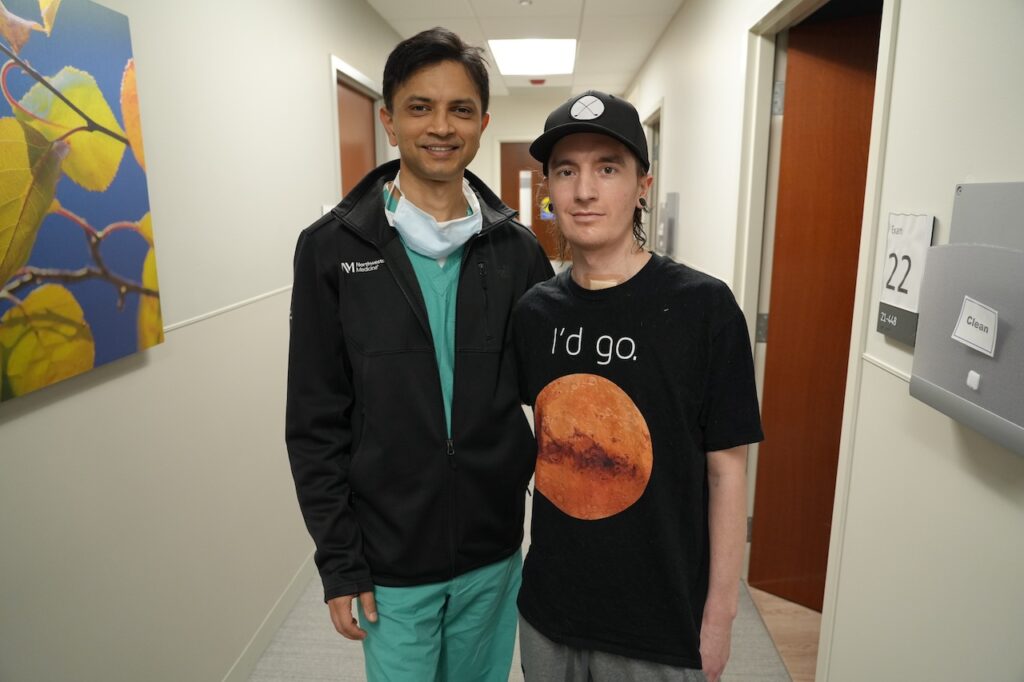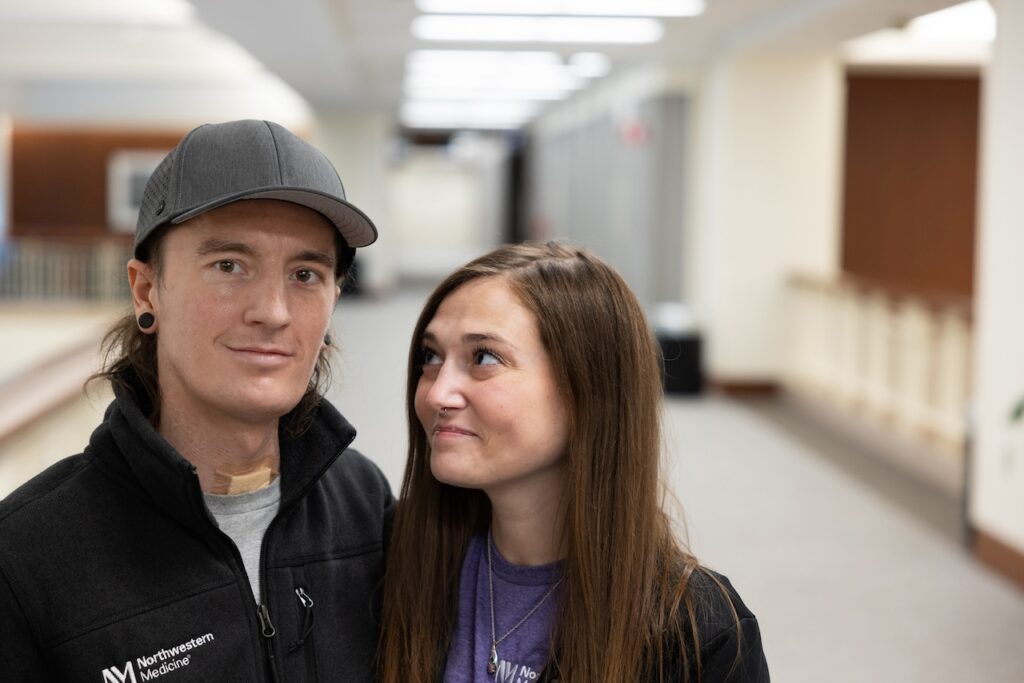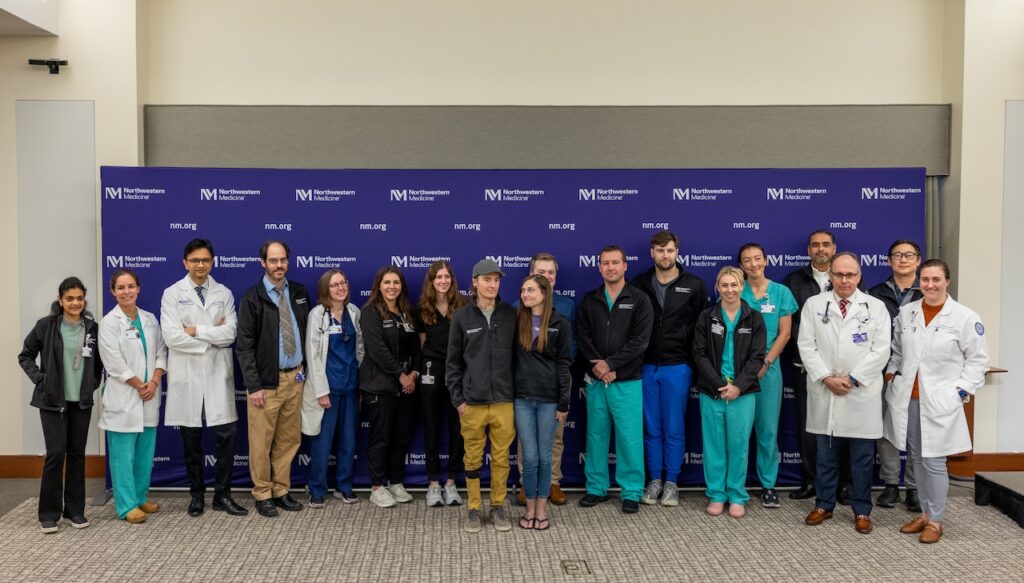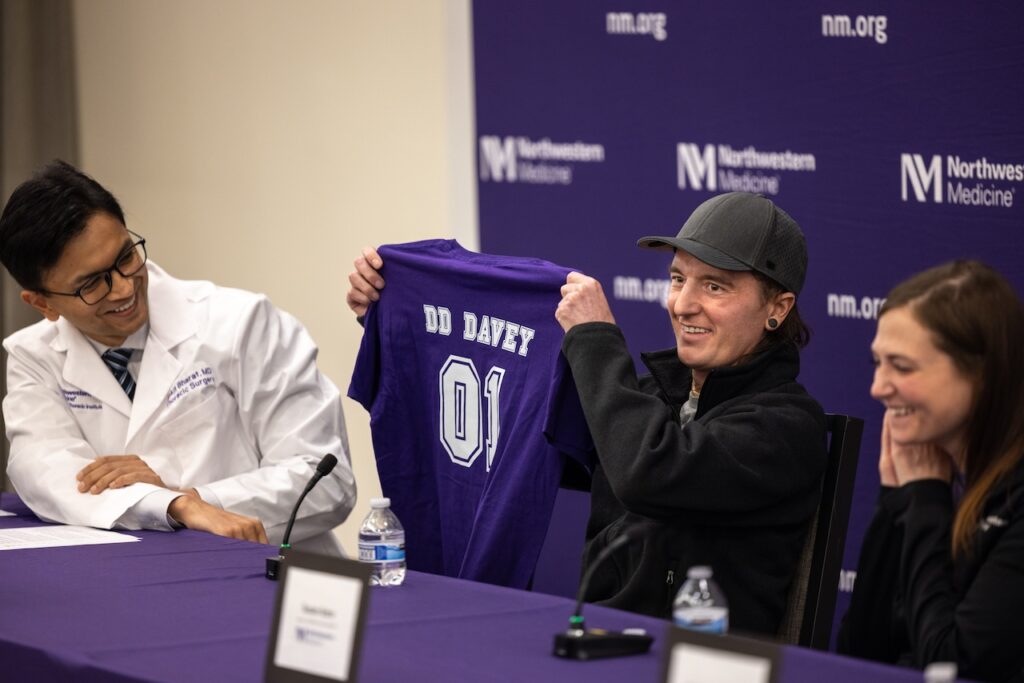In a novel and first-ever use case of its kind, breast implants played a key part in a Missouri man’s life-saving lung transplant, performed in May 2023 by Northwestern Medicine.
Their exact role was to carefully suspend the man’s heart after both of his lungs were removed and while he awaited a donor for 24 hours.
“You know, when you have no lungs, you have to keep the heart right in the center,” Dr. Ankit Bharat, MD, chief of thoracic surgery and director of the Canning Thoracic Institute said.
“And one of our plastic surgeons was very gracious to give me a rapid-fire course in what are the different types of breast implants, what are their shapes, and all that. So we picked out a couple of them that would, you know, they were more malleable, and we could mold them to Davey’s chest.”
Dr. Ankit Bharat, MD, chief of thoracic surgery and director of the Canning Thoracic Institute, Northwestern Medicine
Here is Northwestern Medicine with the full story:
Northwestern Medicine surgeons remove both lungs and use breast implants to save the life of a man who vaped, caught the flu and needed a double-lung transplant
During an innovative procedure, surgeons removed 34-year-old Davey Bauer’s infected lungs, created an artificial lung to keep him alive, placed breast implants inside the chest cavity to keep the heart in place, and listed Bauer for a double-lung transplant, finding a match within 24-hours
For the first time at Northwestern Medicine, surgeons used an artificial lung and breast implants to save the life of a Missouri man who vaped for years, caught the flu and needed a double-lung transplant when his lungs became infected.
The innovative procedure happened in late May, as Northwestern Medicine Canning Thoracic Institute surgeons removed 34-year-old David “Davey” Bauer’s infected lungs, created an artificial lung to keep him alive, placed DD breast implants inside his chest cavity to keep the heart in place, and listed Bauer for a double-lung transplant, finding a match within 24-hours. Bauer was discharged from Northwestern Memorial Hospital in late September and continues to recover at optimal pace in Chicago.

“Davey’s case is remarkable because it shows that we can keep patients alive after removing their lungs through new technology, which can be transformative for many critically ill patients,” said Ankit Bharat, MD, chief of thoracic surgery and director of the Canning Thoracic Institute. “With this new approach that we’ve developed, many patients who get to the point of needing a lung transplant – but their damaged lungs are making them too sick to get one – can now potentially get transplanted. I think it’s going to open a lot of doors for many patients who have no other options.”
Bauer, who enjoys snowboarding, skateboarding, gaming and golfing, works in landscaping and hardscaping in De Soto, Mo., which is near St. Louis. He started smoking cigarettes when he was 21 years old and typically smoked a pack of cigarettes a day until he switched to vaping in 2014.
“Vaping felt better, and I thought it was the healthier alternative, but in all honesty, I found it more addicting than cigarettes,” said Bauer.

In April, Bauer started experiencing shortness of breath, was diagnosed with influenza A (the flu) and developed a lung infection that was resistant to antibiotics. Bauer didn’t receive the flu shot, and up until that point, had never been seriously ill. He was admitted to a hospital in St. Louis and placed on ECMO, a device that does the work of the heart and the lungs, but he continued to decline and a double-lung transplant was his only option for survival.
“Davey’s lungs were so heavily infected that they started to liquify. If you looked at his X-ray, there was nothing left – the lungs were completely filled with puss,” said Rade Tomic, MD, pulmonologist and medical director of the Northwestern Medicine Canning Thoracic Institute Lung Transplant Program. “When we received a call from Davey’s medical team in St. Louis, we thought we could help him, but it was also very clear he wouldn’t survive the transplant in his current condition. He needed to clear the infection before we could list him for transplant, but the only way to do that was to remove both lungs. This was unchartered territory for us, but our team knew if we couldn’t help Davey, no one else could.”
The surgical team quickly came up with a strategy to remove the infected lungs and engineer an “artificial lung” that could attach to Bauer’s body, keeping the blood flowing to the heart, while also keeping his brain and other organs perfused. With both lungs removed, surgeons needed a way to keep Bauer’s heart from physically collapsing inside the chest cavity, and that’s where the idea for DD breast implants came into the picture.
“One of our plastic surgeons was very gracious to give us a rapid-fire course on the different types, shapes and sizes of breast implants, so we picked out a couple options and some of them were easier than others to mold inside Davey’s chest, with the DD option being the best fit,” explained Dr. Bharat. “I never imagined we’d be using DD breast implants to help bridge a patient to lung transplantation, but our team is known for taking on the most difficult cases and thinking outside the box to save lives.”

Once the infected lungs were removed on May 26, Bauer’s body immediately started clearing the infection and he was listed for a double-lung transplant. The team received an offer for new lungs the following day (May 27), and on May 28, the breast implants were taken out and the donor lungs were put in. Bauer spent several months recovering in the intensive care unit before being discharged to rehabilitation therapy in late September.
“Still to this day, I can’t believe Davey lived without any lungs. He was breathing, blood pumping without lungs,” said Bauer’s girlfriend and caretaker, Susan Gore. “While we waited inside his hospital room at Northwestern, I would take a breath in and say, ‘one breath for me and one for Davey.’ It’s hard to wrap my mind around it, and I’m still in awe that Davey was able to do this – it truly shows his strength.”
“I’m so grateful to be alive and know I wouldn’t be here today without the support of my girlfriend, family, friends and my Northwestern Medicine transplant team who never gave up on me,” said Bauer. “While we don’t have definitive ways of proving my years of vaping caused my medical condition, doctors do know for a fact that vaping causes lung injury. If I could go back in time, I never would have picked up a cigarette or vape pen, and I hope my story can help encourage others to quit, because I wouldn’t wish this difficult journey on anyone.”
As for being the first Northwestern Medicine lung transplant patient to have both lungs removed and breast implants temporarily put in their place, Bauer jokes that his new nickname is “DD Davey.”
“I plan to get a t-shirt made that says ‘DD Davey’ on it and change all my gaming profiles,” he said. “But in all seriousness, I’m so proud to be the first Northwestern Medicine patient to undergo this innovative procedure, and I hope this medical first paves the way for more critically ill patients to receive lung transplants in the near future.”

Bauer will remain in Chicago for the next year so his transplant team can continue to closely monitor him. While he misses St. Louis (especially Cardinals’ baseball games), he’s looking forward to enjoying the holidays in a new city with his new lungs. To learn more about Bauer’s medical journey, visit his GoFundMe page.
Patients interested in being evaluated for a lung transplant can contact the referral line at 844.639.5864. For more information about Northwestern Medicine’s lung transplant program, as well as advanced therapies, visit nm.org.
